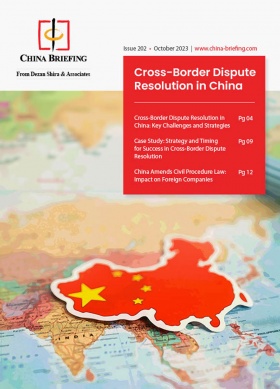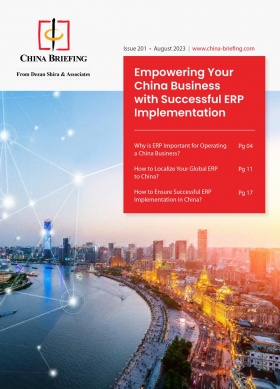The China Project Media Company Announces Closure
The China Project, a renowned English-language publication focused on China, has announced its closure, citing funding challenges as the primary reason for the decision.
The China Project (formerly known as “Sup China”), a well-regarded English-language publication offering comprehensive coverage of China for Western readers, recently declared its forthcoming closure due to financial constraints. The announcement, made by Jeremy Goldkorn, the editor-in-chief, sheds light on the financial difficulties that the media company has faced in recent times.
Since its inception, The China Project has served as a bridge for international audiences seeking in-depth insights into China’s complex socio-political landscape. However, the recent funding issues have underscored the fragility of the media business, ultimately leading to the difficult choice of ceasing operations.
The closure of The China Project highlights the delicate financial landscape that media entities, both new and established, navigate amidst the ever-evolving geopolitical climate.
What is “The China Project”?
The China Project originated in 2016 as a newsletter and later evolved into a comprehensive news and business intelligence company catering to a diverse global audience with a keen interest in China.
In their fundraising document, they wrote: “Our mission is to help the world understand China better. More specifically, our goal is to help decision-makers make sober and informed decisions regarding China.”
Throughout nearly eight years, the media published over 1,800 articles annually, with contributions from 235 writers hailing from 35 different countries.
Over time, the platform expanded its offerings, including the widely acclaimed Sinica podcast, a repository of informative website articles, the innovative ChinaEDGE business intelligence data product, and the facilitation of notable conferences.
How is “The China Project” funded?
Based on open information, The China Project has three major revenue sources:
- First, income from subscription: The China Project offered a subscription package to global readers for US$120 per person per year. It also sold database licenses to its ChinaEdge database for US$1,000 per person per year.
- Second, income from conferences and events: These include corporate sponsors and ticket sales.
- Third, income from business services: The China Project offered a consulting marketplace/expert network, bespoke research and reports, and advertising to clients.
What happened?
On November 6, The China Project post an announcement on its website that they “have begun legal proceedings to unwind the company”, citing funding shortages as the primary reason for the company’s inability to sustain operations. An update on the company’s website highlighted the withdrawal of a crucial funding source, leading to the difficult decision to cease operations.
In the statement, Goldkorn emphasized the company’s commitment to its values over financial considerations. The announcement came shortly after the company’s team hosted its recent annual China-themed conference in New York, featuring various prominent scholars and experts. Goldkorn’s remarks shed light on the challenges faced by media organizations, emphasizing the industry’s vulnerabilities.
The company faced criticism from both the US and China regarding its dedication to “balanced” reporting on US-China topics, resulting in implications both in the legal and financial realms.
“We have been accused many times in both countries of working for nefarious purposes for the government of the other,” Goldkorn said.
CEO Bob Guterma, while asserting the absence of a fundamental business model flaw, acknowledged the challenging climate that hindered the company’s ability to secure sustainable investment. According to him, the interplay of both economic and geopolitical factors significantly impacted the company’s financial stability and its efforts to attract the necessary backing to ensure continued operations
What is the significance?
The closure of The China Project emphasizes the challenges faced by independent media companies in the dynamic global landscape. The intricate interplay of financial constraints and the demands of maintaining balanced reporting have proven to be formidable obstacles for media entities providing nuanced insights on complex geopolitical dynamics.
Furthermore, the closure highlights the uncertainties in media financing, underscoring the difficulties even established platforms encounter in securing sustainable investment and navigating the complexities of the modern media ecosystem.
As the global media landscape continues to evolve, The China Project’s fate serves as an emblematic example of the broader challenges faced by media organizations striving to maintain independence and integrity.
About Us
China Briefing is written and produced by Dezan Shira & Associates. The practice assists foreign investors into China and has done so since 1992 through offices in Beijing, Tianjin, Dalian, Qingdao, Shanghai, Hangzhou, Ningbo, Suzhou, Guangzhou, Dongguan, Zhongshan, Shenzhen, and Hong Kong. Please contact the firm for assistance in China at china@dezshira.com.
Dezan Shira & Associates has offices in Vietnam, Indonesia, Singapore, United States, Germany, Italy, India, and Russia, in addition to our trade research facilities along the Belt & Road Initiative. We also have partner firms assisting foreign investors in The Philippines, Malaysia, Thailand, Bangladesh.
- Previous Article China to Issue RMB 1 Trillion in Special Treasury Bonds to Local Governments in Q4 2023 and Q1 2024
- Next Article Employees Leave Management in Guangdong: New Regulations








